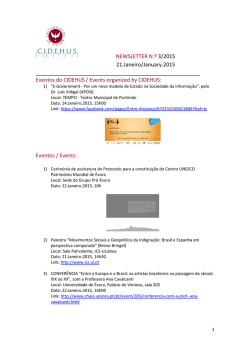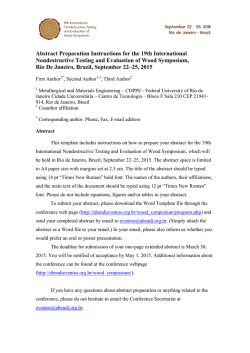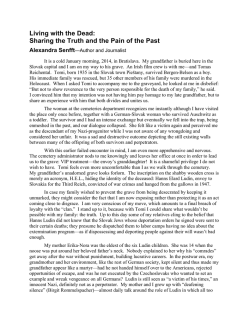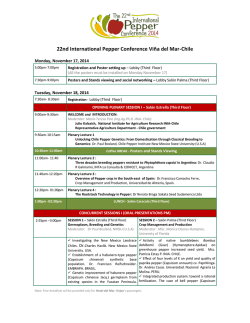
NEWSLETTER 4_28Janeiro
NEWSLETTER N.º 4/2015 28.Janeiro/January.2015 ________________________________________________________ Eventos do CIDEHUS / Events organized by CIDEHUS: 1) Arquivo da Sé de Portalegre: organização, descrição e difusão online Terminou em Dezembro de 2014 o projecto Arquivo da Sé de Portalegre: organização, descrição e difusão online que tinha sido iniciado em Junho de 2013. Este projecto foi um dos vencedores do apoio da Fundação Calouste Gulbenkian na edição de 2012 do concurso para Projectos de Recuperação, Tratamento e Organização de Acervos Documentais e resultou de uma candidatura apresentada pelo CIDEHUS-UÉ, em parceria com o Cabido da Sé de Portalegre. O projecto foi elaborado e executado por Fátima Farrica com a colaboração de Ana Caeiro (responsável pela documentação musical). A intervenção permitiu a organização, a inventariação (em http://fundis.cidehus.uevora.pt) e o acondicionamento da documentação. Eventos / Events: 1) Apresentação do Segundo Volume das Obras Completas de Eduardo Lourenço, com a presença do autor Local: Universidade de Évora, Sala de Docentes do Colégio Espírito Santo Data: 28.Janeiro.2015, 18h00 Link: http://www.ueline.uevora.pt/Canais/academia/%28item%29/15611 2) Conferência “A Decoração da Imaginária Barroca - O Estofado - Técnica de Execução e Boas Práticas de Conservação” Local: Igreja do Salvador, Évora Data: 28.Janeiro.2015, 18h00 Link: www.cultura-alentejo.pt 3) Sessão de Apresentação da Estratégia Regional de Especialização Inteligente Local: edifício sede da Comissão de Coordenação e Desenvolvimento Regional do Alentejo, Évora Data: 30.Janeiro.2015, 15h00 Link: www.ccdr-a.gov.pt 4) Conferência “D. Luís Mendes de Vasconcellos: um homem e o seu tempo”, por Prof. Doutor Arquitecto Mário Alves Chaves Local: Sala dos Leões, Paços do Concelho, Évora Data: 31.Janeiro.2015, 15h00 Link: https://arquivaletrasblog.wordpress.com/2015/01/26/convite-conferencia-d-luismendes-de-vasconcellos-um-homem-e-o-seu-tempo-31-de-janeiro/ 1 5) I Congresso AILPcsh - XII CONLAB IMAGINAR E REPENSAR O SOCIAL Desafios às Ciências Sociais e Humanas nos Espaços de Língua Portuguesa 25 anos depois Local: Faculdade de Ciências Sociais e Humanas da Universidade Nova de Lisboa Data: 1 a 5.Fevereiro.2015 Link: http://www.conlab2015.com/pt 6) Seminário e Workshop do projecto INVENT.ARQ “Inventários de arquivos da família, sécs. XV-XIX: natureza, contextos, interpretação” Local: Torre do Tombo Data: 9.Fevereiro.2015 Link: http://ihc.fcsh.unl.pt/pt/agenda/item/38579-semin%C3%A1rio-e-workshopinvent%C3%A1rios-de-arquivos-da-fam%C3%ADlia-s%C3%A9cs-xv-xix-naturezacontextos-interpreta%C3%A7%C3%A3o 7) Workshop Luso-Brasileiro “A Igreja Católica em Portugal e no Atlântico português (sécs. XVI-XVIII): uma historiografia em renovação?” Local: UCP, Sala Brasil Data: 9 e 10.Fevereiro.2015 Link: www.cehr.ft.lisboa.ucp.pt Call for articles: 1) Anuário do Centro de Estudos de História do Atlântico Prazo limite: 28.Fevereiro.2015 Link: http://ml.ci.uc.pt/mhonarchive/archport/pdfN7QuCBdzpc.pdf 2) History of Humanities The University of Chicago Press is pleased to announce the launch of History of Humanities, a new journal devoted to the historical and comparative study of the humanities. The first issue will be published in the spring of 2016. Prazo limite: n/d Link: http://press.uchicago.edu/pressReleases/2014/October/1410HOH.htm 3) Call for Book Reviews - Anais de História de Além-Mar Prazo limite: Vol. XV (2014): 30.Abril.2015 Vol. XVI (2015): 29.Maio.2015 Link: http://www.cham.fcsh.unl.pt/noticias.aspx?NewsId=191 4) Anuario de Estudios Atlánticos Prazo limite: 31.Maio.2015 Link: http://anuariosatlanticos.casadecolon.com/index.php/aea 2 5) • • • • • • • • The Cultural Turn in History Prazo limite: 30.Junho.2015 Link: http://www.unibuc.ro/facultati/istorie/anale-istorie/ The shift of emphasis in recent decades from the grand political narratives or the serialization of quantitative data to the meaning of words, gestures, and representations has radically transformed history, along with its neighbouring disciplines in the humanities and the social sciences. This ‘cultural turn’ that emerged in the 1970s has not only provided for a whole new range of research approaches that became increasingly interdisciplinary, but has also made us aware of the changing and sometimes contested connotations conveyed by artefacts and records. However, this has not been without its tensions, as our discipline was faced with the dilemmas arising from the failure of paradigms and the disputes over the very scientific character thereof. Issue 1/2015 of Analele Universitãții din București – Istorie aims to explore some of the consequences of these developments, by encouraging both theoretical overviews, as well as empirical case studies. Papers are invited on questions such as: Cultural history and its neighbours Challenges of the ‘cultural turn’ Collective identities and the self Emotions in history and the arts Memory, remembrance, representations of the past Social status and cultural consumption Mass communication and popular entertainment The cultural history of intellectual practices AUB-Istorie is the biannual, peer-reviewed, interdisciplinary, academic journal, issued by the Faculty of History, University of Bucharest since 1956. Published biannually, the journal aims to bring together historians, political scientists and sociologists in order to create a forum for intellectually stimulating and interdisciplinary debate. AUB-Istorie is available online through the EBSCO database. Language of Publication: Articles may be written in English or in French. Submissions are encouraged from both early career and established scholars. Submitted papers should neither have been previously published, nor be under consideration for publication elsewhere. AUB–Istorie operates a double-blind refereeing process for evaluating the originality, quality and relevance of the submitted papers. We also welcome reviews of recent books in the fields of history and neighbouring disciplines. Please address your manuscripts and all other correspondence to [email protected] 6) Present Tense: A Journal of Rhetoric in Society announce a special issue centering on Race, Rhetoric, and the State In response to the urgent situation of states around the world treating their citizens of color in problematic ways, Present Tense: A Journal of Rhetoric in Society is excited to announce a special issue centering on Race, Rhetoric, and the State to be published in the fall of 2015. Recent troubling, state-influenced events around the world regarding issues of race and violence have had traumatic, and sometimes deadly, impact. Some of these events include: two juries’ decisions to exonerate police for the killings of Michael Brown and Eric Garner; a police officer’s brutal assault and arrest of Professor Ersula Ore; thousands of unaccompanied illegal immigrant children being indefinitely detained by the American government; a Congressional giving-away of Apache lands to an Australian mining company; the rise of global anti-immigration nativism in relation to 3 • • • • • • • • • • • • • • • climate refugees. As rhetoricians, we have cause to interrogate and investigate these questionable actions and consider the role of the state as a perpetrator and enforcer of violence. What galvanizes our aim with this special issue is the increasing call by scholars across disciplines for academic communities to critically engage violence and repression committed by and on behalf of the state. In essence, we seek to explore the ways in which the structures of the state (e.g., cultural, legal, political, religious) explicitly and implicitly normalize violence against communities of color. Issue editors Alexandra Hidalgo and Donnie Johnson Sackey invite submissions on the following topics, as well as others that respond to states around the world treating people of color in questionable ways: Police Brutality Against Communities of Color Immigration Law and Dehumanization of Illegal Immigrants The French Government’s Response to Charlie Hebdo Attacks (e.g., anti-semitism; islamophobia) Violence Against Indigenous Peoples (e.g. Idle No More, environmental racism) State Violence Directed at Women of Color (e.g., compulsory sterilization) Incarceration and State Violence in the Criminal Justice System and For-Profit Prisons Settler Colonialism and Other Forms of Neo-Colonialism The Canadian Government’s Lack of Response to Missing and Murdered Indigenous Women Religious Violence Perpetuated by the State Material Conditions of Marginality Among Communities of Color Redefinitions of Torture and Guantanamo Bay Media Representations of People of Color as Criminal/Threatening or Helpless Victims Systemic and State-Influenced Racial Digital Divides Racially-Driven Virtual Violence in Social Media and Gaming Racial Inequality in the War on Drugs Please send your submissions to [email protected] by July 1, 2015. Present Tense articles are no longer than 2,500 words. We are particularly interested in articles that engage with digital media (video, podcasts, slidecasts). If you have any questions about whether a piece would be a good fit for this issue, please email us at [email protected]. Call for papers: 1) Primer Congreso Latinoamericano de Glotopolítica Local: Santiago (Chile) Data: 13 e 14.Agosto.2015 Prazo limite: 31.Janeiro.2015 Link: http://www.filosofia.uchile.cl/noticias/108011/convocatoria-al-primer-congresolatinoamericano-de-glotopolitica 2) “Negotiating the Public sphere: Rethinking History From Below” Local: University of California, Irvine Data: 10.Abril.2015 Prazo limite: 1.Fevereiro.2015 Link:http://www.euni.de/tools/jobpopup.php?lang=en&option=showJobs&jobid=2152 3&jobtyp=8&university=University+of+California%2C+Irvine&country=US&sid=7588 In recent years, countries and political entities across the globe--Egypt, India, the United States, Hong Kong, and Scotland, to name a few--have witnessed fierce contestation over the limits of democracy and civil society in a shifting global political landscape. The UC Irvine History Graduate Student Association is seeking papers and panel ideas from all disciplines for this year’s conference on the theme of negotiating 4 the public sphere: rethinking history from below. This conference aims to promote fruitful exchange and reflection on the role of the public sphere around the world, past and present, and its use in promoting policy change, critical awareness, and international dialogue. Those interested in participating in the conference should submit a 300-word abstract by February 1 to Sarah Mellors at [email protected]. Be sure to include your name and institutional affiliation. Though travel funds are not available through the history department, visiting presenters may be offered on-campus accommodation. 3) III Encontro Anual A Europa e o Mundo A (des)construção da Europa (1939-1945) Local: Faculdade de Letras – Universidade de Coimbra Data: 23 e 24.Março.2015 Prazo limite: 31.Janeiro.2015 Link: http://www.uc.pt/iii/ceis20/Congressos/europa_mundo_2014 4) 11th International Conference on Natural Computation (ICNC 2015) and 2015 12th International Conference on Fuzzy Systems and Knowledge Discovery (FSKD 2015) Local: Zhangjiajie, China Data: 15 a 17.Agosto.2015 Prazo limite: 10.Fevereiro.2015 Link: http://icnc-fskd.hnu.edu.cn/ 5) 2ª edição do Congresso Luso-Brasileiro de História da Medicina Tropical Local: Faculdade de Ciências e Tecnologia, UNL Data: 14 e 16.Outubro.2015 Prazo limite: 2.Março.2015 Link: http://instagram.com/muhnac 6) Conferência Internacional “O Poder das Narrativas, as Narrativas do Poder: Prémios Literários, cânone e políticas editoriais no universo da língua Portuguesa” Local: Centro de Estudos Humanísticos da Universidade do Minho Data: 2 e 3.Julho.2015 Prazo limite: 15.Março.2015 Link: http://ceh.ilch.uminho.pt/eventos_cientificos.php 7) CIT2015 - International Congress on Tourism “The Sea and Tourism” Local: ISCET, Porto Data: 21 a 23.Junho.2015 Prazo limite: 15.Março.2015 Link: http://cit2015.iscet.pt 8) XVI Universeum Network Meeting Local: National and Kapodistrian University of Athens, Greece Data: 11 a 13.Junho.2015 Prazo limite: 15.Março.2015 Link: http://www.universeum.it/meetings.html 9) XXVIII Simpósio Nacional de História Local: Florianópolis, em Santa Catarina, Brasil Data: 27 a 31.Julho.2015 Prazo limite: 31.março.2015 Link: http://www.snh2015.anpuh.org/simposio/view?ID_SIMPOSIO=2057 5 10) 10th International Conference on the History of Chemistry – 10ICHC 2015 Chemical Biography in the 21st century Local: Aveiro Data: 9 a 12.Setembro.2015 Prazo limite: 31.Março.2015 Link: http://10ichc-2015.web.ua.pt/ 11) CENTERIS 2015 - Conference on ENTERprise Information Systems Local: Vilamoura, Algarve Data: 7 a 9.Outubro.2015 Prazo limite: 3.Abril.2015 Link: http://centeris.scika.org 12) International Conference Société d’études anglo-américaines des XVIIe et XVIIIie siècles Local: Université Paris Diderot – Paris 7 Data: 15 e 16.Janeiro.2016 Prazo limite: 24.Abril.2015 Link:http://www.anglisti.it/index.php?option=com_content&view=article&id=237:inte rnational-conference-societe-d-etudes-anglo-americaines-des-xviie-et-xviiiesiecles&catid=12:aia-news&Itemid=249 Modes of Silence in the Seventeenth- and Eighteenth-Century Anglo-American World Defining silence seems to pose a challenge to lexicographers in the contemporary period as it did in the early modern era. According to OED, silence is a “complete absence of sounds; the fact or state of abstaining from speech”, while Phillips’s New World of Words: Or, A Universal English Dictionary (1700) suggests that silence is “oppos’d to noise, crys and tumult”, as if silence could only be understood negatively in its relation to sounds or speech. Silence is ineffable; it imposes itself on us. It is celebrated by popular wisdom: virtuous men know how to keep silent whereas vain wits engage in endless prattling. The way the two Roman goddesses of silence, Angerona and Tacita, are typically represented can be read as a warning to all those who cannot remain silent: the former is often shown with a finger on her lips, urging us not to speak, while the latter is depicted with her tongue ripped off as a punishment for her garrulity. The Bible presents silence in an ambiguous fashion: the Psalmist orders liars and slanderers of all stripes to be silent but begs God not to hold his peace. For the congregation silence is a prelude to the reception of the Word of God as mediated by those who have been entrusted with it: John Donne’s sermons, like Paul’s, it seems, had the power of imposing silence. Ecclesiastes says that there is “a time to keep silent, and a time to speak”. It is common knowledge that monastic silence was a rule of thumb as well as a living ideal, making it possible for contemplation to emerge from the exertions of an active life. Not holding one’s peace, however, is sometimes a moral or political necessity, when it comes to thwarting conspiracies or denouncing misdeeds. In that case, silence is more dangerous or more reprehensible than speech. When speech becomes subversive and threatens institutional order and existing hierarchies, silencing political or religious opposition as well as dissenting voices becomes a priority for established authorities, 6 sometimes even to the point of obsession. The repression of dissent is carried out in a number of ways, not least through censorship. The aim of this conference is to explore modes of silence, understood as the voluntary or involuntary renunciation of speech, in the seventeenth- and eighteenth-century Anglo-American world. Various approaches covering a wide range of disciplines are welcome: literature, art history, history of religion, politics and science, history of the book. The organisers will especially value papers that study the dynamics of silence and speech. Silence may be a voluntary renunciation of speech when in sermons or sacred poetry it gives way to the voice of God. It may also result from the realisation that language is inherently flawed, thus making it possible for speakers to challenge the linguistic and rhetorical conventions of their time. Censorship may impose silence and may sometimes lead writers to try and elude or circumvent the censors. 13) Congreso Internacional “Decadencia o Reconfiguracion? Las monarquías de España y Portugal en el cambio de siglos (1640-1724)” Local: Universidad Autónoma de Madrid e Universidad Rey Juan Carlos Data: 2 a 4.Dezembro.2015 Prazo limite: 10.Abril.2015 Link: https://congresodecadencia.wordpress.com/ Arquivos / Archives: 1) SIMURG, Fondos digitalizados del CSIC, incorpora un nuevo conjunto documental de la biblioteca de la Institución Milá y Fontanals, dentro de la política de difusión de los fondos de valor patrimonial que se lleva a cabo en la Institución. En esta ocasión se ofrece a los usuarios más de 100 obras datadas entre los siglos XVI y XIX de contenido histórico: crónicas medievales, obras sobre órdenes militares, instituciones religiosas, etc. así como material relativo a las ciencias auxiliares, como la paleografía y diplomática; se puede destacar el fondo específico referido a la historia de Cataluña y a la ciudad de Barcelona. Link: http://simurg.bibliotecas.csic.es/viewer/browse/bibliotecas.imf/-/1/-/-/ 2) Projeto Gallaeciae Monumenta Historica. Gallaeciae Monumenta Historica é um projeto que tem por objetivo digitalizar e colocar na rede o amplo corpus de documentação medieval de Galiza, bem como os textos de âmbito académico relacionados. Este repositório permite a pesquisa cruzada em milhares de documentos, com o que é possível conhecer a Galiza medieval através dos seus protagonistas, dos temas e dos lugares que aludem. O repositório é aberto a novas contribuições provenientes do âmbito da investigação ―Novos textos arquivísticos e ensaios académicos―, como também à experiência e conhecimentos dos usuários. Colaboraram na realização desta plataforma a Real Academia Galega, o Centro Ramón Piñeiro (Xunta de Galicia), o Instituto de Estudos Galegos “Padre Sarmiento” do CSIC e o Instituto da Lingua Galega da Universidade de Santiago de Compostela. Link: http://gmh.consellodacultura.org/ 7 Bolsas / Estágios / Emprego Científico / Oportunidades / Scholarships / Opportunities: 1) ‘Suscitação de Candidaturas Docentes’ da Faculdade de Ciências Sociais e Humanas da Universidade Nova de Lisboa para colaboração docente no Departamento de Linguística no 2º semestre do presente ano letivo. Prazo limite: 9.Fevereiro.2015 Link: http://www.fcsh.unl.pt/faculdade/anuncios-e-concursos 2) Bolsa de Gestão de Ciência e Tecnologia no âmbito da instituição de I&D Centro de Estudos de Comunicação e Cultura da Faculdade de Ciências Humanas da Universidade Católica Portuguesa Prazo limite: 10.Fevereiro.2015 Link:http://www.eracareers.pt/opportunities/index.aspx?task=global&jobId=53381&la ng=pt Lançamento de Livros / Revistas / Boletins / Índices de Periódicos / Books launches: 1) O Instituto Prometheus lança a edição nº8 da sua Revista tri-mensal a Revista Férula. Esta edição aborda questões da Antiguidade Pré-Clássica e Clássica, sentimos Avis e revivemos a sua grandiosidade, entre outros artigos e temas. Link: http://issuu.com/institutoprometheus/docs/revista_f__rula_8_reduz 2) Publicación volumen 3/número 6 Revista Universitaria de Historia Militar Dossier: La Guerra Civil Española de 1936-1939 en la nueva historia militar Coordinadores: Javier Rodrigo y Manuel Santirso Link: http://www.revista-historiamilitar.org/ 3) “Nobrezas do Novo Mundo”, de Ronald Raminelli A obra será lançada nos próximos meses e será noticiada. 4) Nuevo ejemplar de Revista de historia moderna: Anales de la Universidad de Alicante Año: 2014, Número: 32. Dedicado a: Agentes y espacios jurisdiccionales Link: http://dialnet.unirioja.es/servlet/ejemplar?codigo=384849 5) Acaba de ser editado o E-book intitulado “Entre Crise e Euforia: práticas e políticas educativas no Brasil e em Portugal” no qual se encontram reunidos os textos da grande maioria das comunicações apresentadas no IV Colóquio Luso-brasileiro de Sociologia da Educação, realizado em Junho de 2014, no Porto. Link: http://ler.letras.up.pt/site/default.aspx?qry=id022id1450&sum=sim. Este livro encontra-se organizado em cinco grandes secções temáticas - 1) Entre escolhas, formações e mandatos: (re)construções da profissão docente; 2) Infância e Juventude: Culturas, Experiências e Transições, 3) Famílias, Usos das TIC e Papel dos 8 Media na Educação; 4) Desigualdades Educacionais: Escolas, Construção das (In)Justiças e Procura da Qualidade; 5) Políticas de escolarização, compensação e avaliação – que ilustram bem a variedade de tópicos em que se centram as pesquisas na área da sociologia da educação, mais recentemente realizadas em Portugal e no Brasil, e dão conta da complexidade dos fenómenos educativos na contemporaneidade. 6) E-book Educação, Ciência e Cultura na era Digital (ISBN: 978-989-98240-3-4),que reúne as várias comunicações apresentadas na conferência homónima, organizada pelo CEI, em parceria com a Universidade Aberta, a 19 de Fevereiro de 2014, no ISCAP. Link: www.iscap.ipp.pt/cei Programas: 1) Candidaturas a Projectos de recuperação, tratamento e organização de acervos documentais Prazo limite: 19.Fevereiro.2015 Link: http://www.gulbenkian.pt/Institucional/pt/Apoios/ApoioProjetos?a=1510 9
© Copyright 2026




